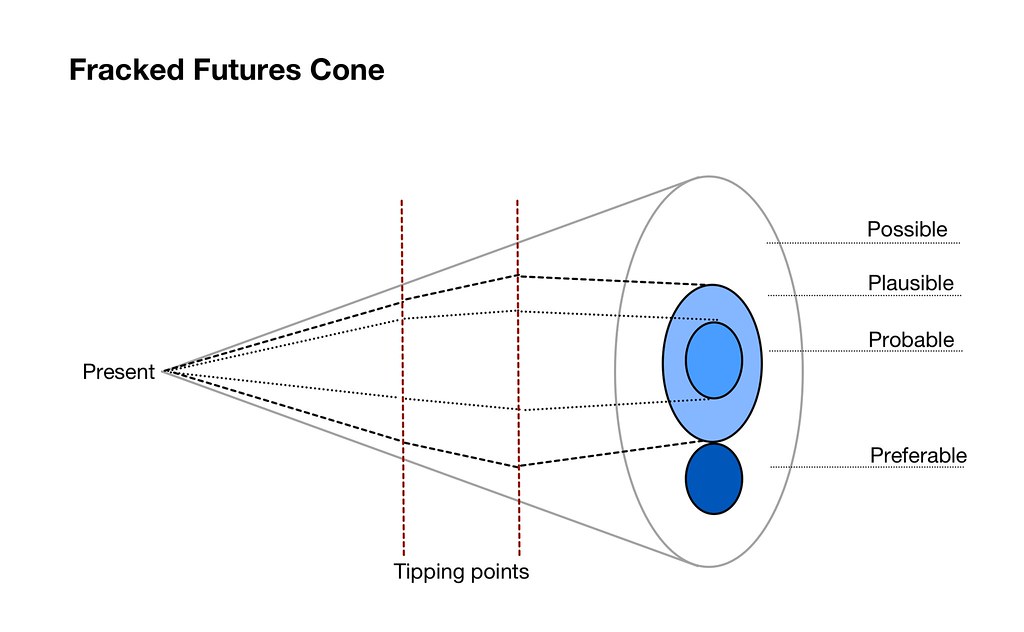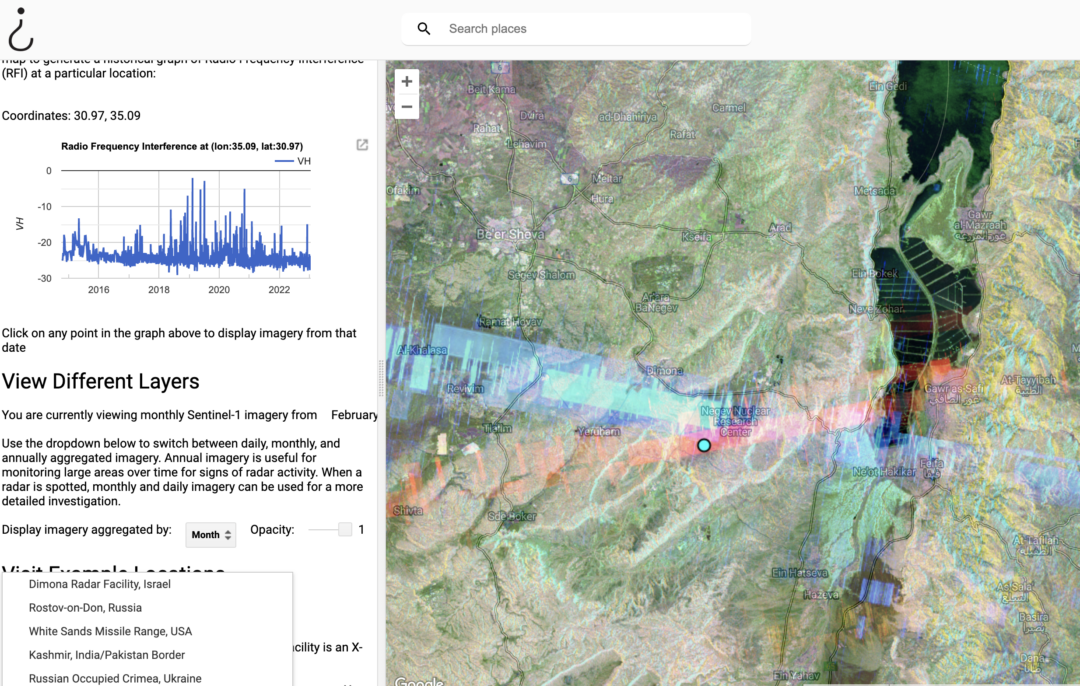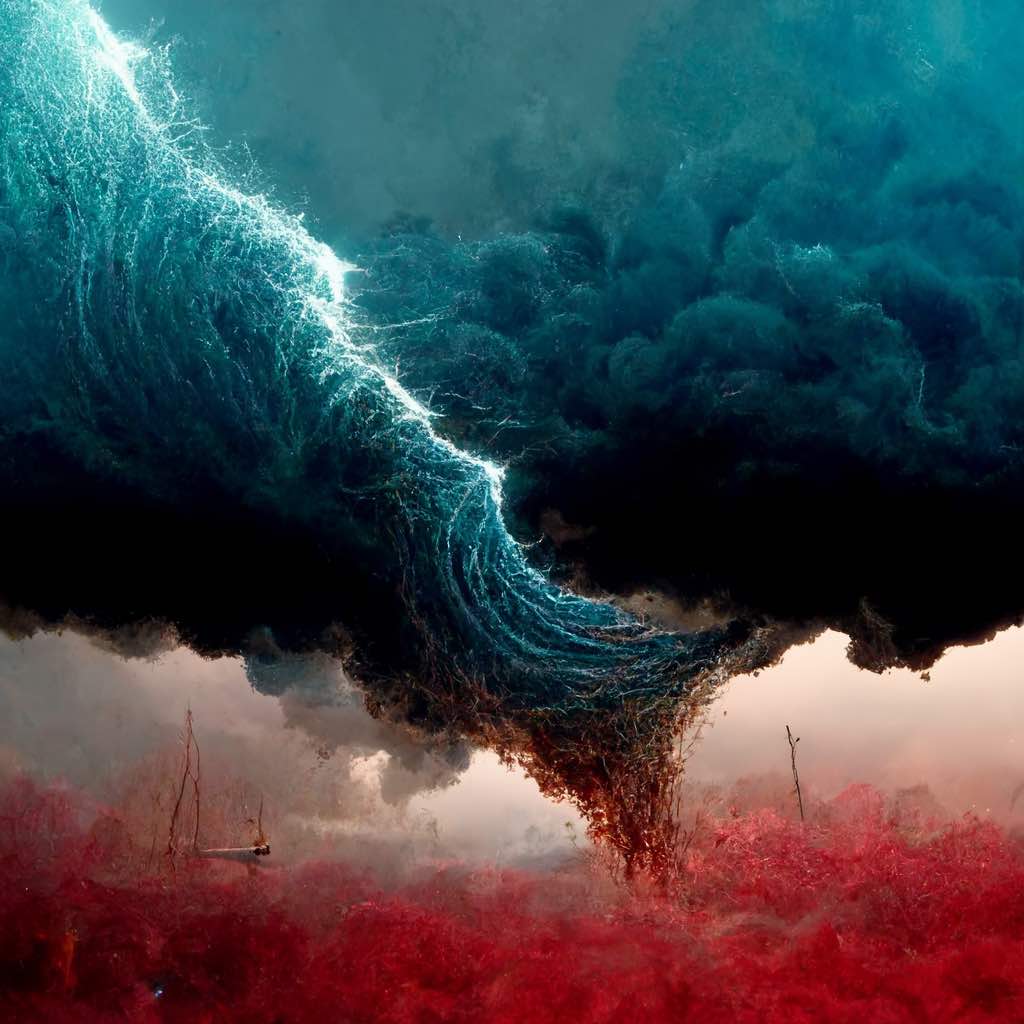In this post, I’d like to explore the idea that we’ve been fracking the future at great expense to future generations.
A note on the context of this post: When I started out writing this, I was writing it with the term “de-colonizing futures” in mind. In the end, I found the term brought a lot of associations with it that I rather didn’t want to focus on — it’s not one I wanted to risk appropriating inappropriately, as it were. (Thanks to Eve Tuck and K. Wayne Yang for making this point very concisely in their paper “Decolonization is not a metaphor” (PDF) which I highly recommend even though it was written for a slightly different context.) Colonialism is too serious an issue. This also means that I’m moving away from a pretty literal transposition of that term, and into a more metaphorical space: I settled on the fracking metaphor instead; strip-mining would work too: Neither are quite as literal — or frankly, as punchy as a headline — but they have the extra quality of allowing us to move ahead a little more boldly without alienating people in pursuit of a punchy headline. So here goes.
Consider decisions of the past and present, and how they impact the future: They increase the options space available in the future, or reduce it.
The last couple of hundred years, we’ve systemically externalized costs and damages to the future: We’ve exploited natural resources and burned up all the fossil fuels we could lay our collective fingers on. We’ve created (relative)short term wealth at the direct expense of future generations, of future wealth and health.
Kim Stanley Robinson speaks of a multi-generational ponzi scheme:
“Capitalism devalues the future, and thus cheats future generations who are not here to represent themselves or fight for their rights. It’s a multi-generational Ponzi scheme that we’re all involved in together.”
I agree with his assessment that our current system devalues the future. And like any ponzi scheme, that’s fraud. But I think this phrase still downplays just how bad this is: We can still catch someone running a ponzi scheme and send them to jail; we might even be able to give the defrauded their money back. But here, that’s not an option. The stakes are too high, and too irreversible.
So, higher stakes, more systemic injustice — we need a more apt term. We’re fracking the future. We’re all implicated, and it’s happening on our watch.
Present decisions that bolster the status quo mean a fracking of the future, by the present/past. (From the future’s point of view, past and our present are of course the same.)
If you look at the traditional futures cone, a common tool of exploring possible futures and helping to steer us towards the sub-section of futures that aren’t just possible but preferable, it looks something like this:

If our decisions and actions reduce the options space available to those in the future, they’re objectively bad. We’re strip mining the potential of the future.
Especially if we think about the context of climate change — increasingly the only lens and context I think of as relevant at all, as a livable planet is a pre-condition for just about any societal thriving at all — we need to consider irreversible damages done. These are the so-called tipping points from which there is no returning. The damages of those are permanent. Maybe the best-known expected tipping point is the global warming of 2°C above pre-industrial levels, but there are many others — including some we might have already passed.
In fact we’ve passed many; every extinct species is one. But our failure rate has been so high that only the biggest, most catastrophic tipping points even make the cut into the debate: Those that will lead to irreversible systemic failures.
To get an impression, check out this visualization of what to expect at 1 / 2 / 3 degrees warming. The difference between 1°C and 3°C is roughly the difference between civilization as we know it and living hell.
At 40 years of age, I assume I’m in a bridge generation that both contributed a lot to the problem and is among the first to acutely feel the damages during our lifetime.
So, tipping points. If we add those to the futures cone, like I’ve done in this very improvised infographic below, we get to an immediately obvious issue:

After every tipping point, the options space — the range of plausible futures — shrinks, and the overlap between possible, plausible and preferable shrinks. And quite possibly there is no overlap anymore: Preferable futures: canceled.
So we need to un-frack the future, win it back for future generations. This has to be not just a (multi)generational effort, but also an extremely broad one involving all levels of policy and governance.
How we get there I don’t know. But that cannot, must not stop us from trying. And I don’t mean the half-assed attempts we see right now, where we try to have it both ways: No changes, all different outcomes.
What we should collectively be doing — we meaning all governments, corporations, individuals, but especially those with disproportionate leverage like the worst carbon emitting countries — is orient all our decisions in a way to increase the overlap of probable and preferable outcomes. In other words, move that preferable circle right into the center of the probable circle — which first means widening the plausible, too: By avoiding tipping points through immediate action in order to keep options on the table that will otherwise not be.

We have to put planetary health as the leading principle over everything else. I expect that in the longer term that would have a ton of positive externalities to boot: More resilience, less poverty. Better quality of life, better health. Less political strive as we switch from an economy of scarcity to one of plentitude: Think near-infinite, near-free energy at all times. It could be kind of like solarpunk but real. But it means we need to remove fossil fuels from the equation right this moment. Stop that lame-ass phasing out stuff; just kick the habit cold. It’ll hurt and it’ll cost a lot. But it’ll hurt and cost much less than the alternatives.
Because of the Covid pandemic governments are in a spending mood. Let’s make it count towards long-term systemic change.

![Emotional Algos & the Failure of Capitalism [Connection Problem]](https://plus.unsplash.com/premium_photo-1668624623619-a16f5e15724d?ixlib=rb-4.0.3&ixid=M3wxMjA3fDB8MHxwaG90by1wYWdlfHx8fGVufDB8fHx8fA%3D%3D&auto=format&fit=crop&w=1798&q=80)

